Revivalists: 1974-82
By:
April 17, 2010
Editor’s note: This is one of the most popular posts, traffic-wise, ever published on HiLobrow. Click here to see a list of the Top 25 Most Popular posts (as of October 2012); and click here for an archive of all of HILOBROW’s most popular posts.
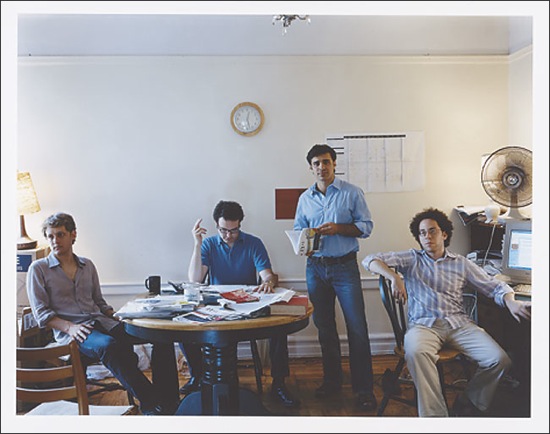
Members of the Revivalist Generation were in their teens and 20s in the Nineties (1994-2003; not to be confused with the ’90s); and they are in their 20s and 30s now, in the decade we might call the Oughts (2004-2013; not to be confused with the ’00s).
Though their eldest were lumped in with the so-called Generation X (an MSM-concocted hodgepodge of Reconstructionists, younger OGXers, and older Revivalists), most members of the 1974-82 cohort were lumped into the so-called “Generation Y.” Which, to journalists and pop sociologists, means: parent-loving, resume-polishing, conservative paragons of virtue. That description might fit their immediate juniors, the so-called Millennials (i.e., the Social Darwikians), but it’s not an accurate portrayal of the Revivalist Generation. Revivalists are precocious and earnest, entrepreneurial, and dedicated to renewing bygone cultural forms and franchises.
Some of our favorite hi-, lo-, and hilobrow Revivalists include: Marco Roth, Keith Gessen, and Mark Greif; Jack White and Meg White; Talib Kweli, Aesop Rock, Madlib (rapper) (honorary), and Danger Mouse; Neil Patrick Harris (honorary); M.I.A., Dan Auerbach, and Conor Oberst; Sufjan Stevens, Devendra Banhart, and Joanna Newsom; Amy Winehouse (honorary), Russell Brand, and Zadie Smith. PLUS: Cee-Lo, Steve-O, and Karen O.

Note that the Revivalists (like the Post-Romantics) are a nine-year, as opposed to a ten-year cohort. This is due to seismic cultural shifts whose nature I am attempting to ascertain.
A reminder of my 250-year generational periodization scheme:
1755-64: [Republican Generation] Perfectibilists
1765-74: [Republican, Compromise Generations] Original Romantics
1775-84: [Compromise Generation] Ironic Idealists
1785-94: [Compromise, Transcendental Generations] Original Prometheans
1795-1804: [Transcendental Generation] Monomaniacs
1805-14: [Transcendental Generation] Autotelics
1815-24: [Transcendental, Gilded Generations] Retrogressivists
1825-33: [Gilded Generation] Post-Romantics
1834-43: [Gilded Generation] Original Decadents
1844-53: [Progressive Generation] New Prometheans
1854-63: [Progressive, Missionary Generations] Plutonians
1864-73: [Missionary Generation] Anarcho-Symbolists
1874-83: [Missionary Generation] Psychonauts
1884-93: [Lost Generation] Modernists
1894-1903: [Lost, Greatest/GI Generations] Hardboileds
1904-13: [Greatest/GI Generation] Partisans
1914-23: [Greatest/GI Generation] New Gods
1924-33: [Silent Generation] Postmodernists
1934-43: [Silent Generation] Anti-Anti-Utopians
1944-53: [Boomers] Blank Generation
1954-63: [Boomers] OGXers
1964-73: [Generation X, Thirteenth Generation] Reconstructionists
1974-82: [Generations X, Y] Revivalists
1983-92: [Millennial Generation] Social Darwikians
1993-2002: [Millennials, Generation Z] TBA
LEARN MORE about this periodization scheme | READ ALL generational articles on HiLobrow.
PRECOCIOUS & EARNEST
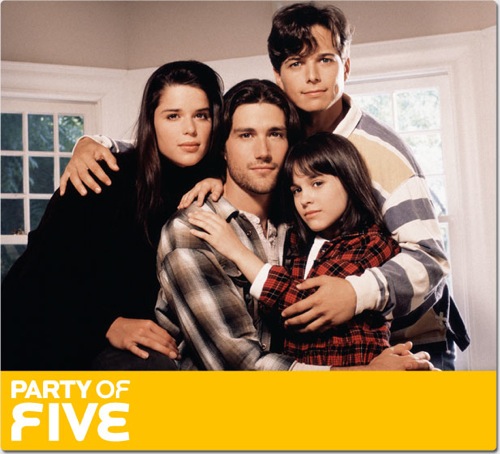
The cynicism, irony, and skepticism that had sustained previous generations during the Cold War reached an apex, during the Nineties — think of Seinfeld and The Simpsons, for example. At a tender age, several Revivalists — most famously, Jedediah Purdy — called for and modeled a hip mode of earnestness, instead. For their immediate elders, the Reconstructionists (my own generation), this was confusing, off-putting. Our younger siblings, if you will, seemed more mature and together, in certain respects, than we did. They were the Claudia Salinger, if you’ll forgive the Party of Five reference, to our Charlie. They didn’t want to learn, from us, how to rebel; instead, they wanted to parent us.
This no doubt explains why the earnest hipster Dave Eggers, though often unpopular among fellow Recons, was beloved by his Revivalist juniors. If you’ll recall, in his Heartbreaking Work of Staggering Genius, he explicitly encouraged readers to regard his own family as a real-life Party of Five; and in his introduction to the bestseller’s paperback edition, he took great pains to reject the notion that he was in any way cynical, ironical, or skeptical. This may also explain why the post-ironic fiction of David Foster Wallace is more popular among Revivalists than it is among members of his own generation.
Although the Recons may have invented the Web as we know it, the Revivalists made use of the Web for a hip, earnest form of social activism: a networked “movement of movements.” Madrid94, J18, Seattle/N30, Genoa: These are the political touchstones for the Revivalist Generation’s so-called anti-globalization movement. Revivalists also founded City Year (founded in 1988), Teach for America (1990), AmeriCorps (1994); and they pioneered the “service learning” trend.
WISED-UP KIDS. Fictional precocious kids from the Recon generation — e.g., Anthony Michael Hall in Sixteen Candles and Breakfast Club, Ricky Schroder on Silver Spoons, Matt Damon in Good Will Hunting — were (depending on their age) portrayed as pathetic geeks, tortured outcasts, or annoying brats. But think of Natalie Portman in The Professional and Beautiful Girls, Anna Paquin in The Piano (and those MCI commercials), Sara Gilbert on Roseanne, Jason Schwartzman in Rushmore, Fred Savage on The Wonder Years, Claire Danes on My So-Called Life, Topher Grace on That ’70s Show, Mark-Paul Gosselaar on Saved by the Bell, Thora Birch in American Beauty and Ghost World, Christina Ricci in Mermaids and The Addams Family, Wiley Wiggins in Dazed and Confused, Edward Furlong in Terminator 2, Anna Chlumsky in My Girl, Kristen Bell on Veronica Mars, Alexis Bledel on Gilmore Girls. Not to mention honorary Revivalist Neil Patrick Harris (Doogie Howser, M.D.) and the entire cast of Dawson’s Creek. Like Lacey Chabert (Claudia Salinger), Revivalists were portrayed as hyper-articulate, wised-up, and altogether un-childlike.
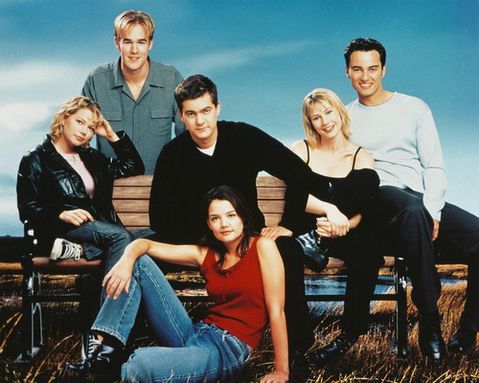
CHIC GEEKS. Revivalists, fictional and real-life, were the first chic geeks — that is, they successfully merged a strong proficiency with technology and coolness/attractiveness. Adam Brody (Seth Cohen on The O.C.) and Alexis Bledel (Rory on Gilmore Girls) were only the most obvious fictional examples. Math wizard and programming wunderkind Bram Cohen, the cofounder of BitTorrent; Chad Hurley and Steve Chen, the cofounders of YouTube; Digg’s Kevin Rose; Slashdot’s Rob Malda; and Janus Friis, cofounder of KaZaA, Skype, and Joost, are real-life chic geeks — and all Revivalists.

WUNDERKINDS. In the arts, too, we’ve come to expect Revivalists — Zadie Smith and Jonathan Safran Foer; the founding editors of the intellectual journal n+1 (Keith Gessen, Mark Greif, Marco Roth; the fourth founder, Ben Kunkel, is a Recon); Conor “Bright Eyes” Oberst — to achieve great things while still wet behind the ears.
ENTREPRENEURIAL
In a 2000 New York Times story titled “Coming of Age, Seeking an Identity,” sociologist Arlie Russell Hochschild was one of the first to point out that there was no such thing as Generations X or Y. What defined Americans then in their late teens and early-to-mid-20s (i.e., the cohort I call the Revivalists), she said, was the fact the were coming of age during an era in which America was trending “toward a more loosely jointed, limited-liability society, the privatizing influence of that trend and the crash-boom-bang of the market….” Result? Unlike the slow-to-start Recons, Revivalists were ferociously entrepreneurial from the get-go.
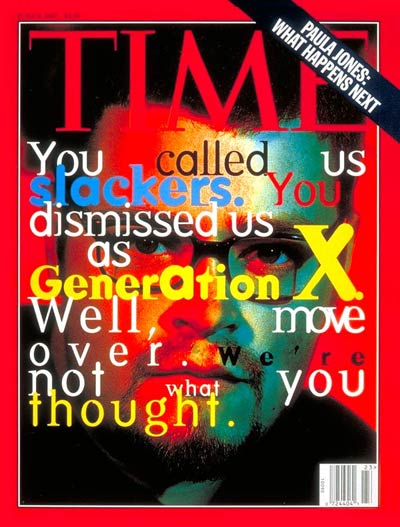
US economic growth accelerated as the Nineties (1994-2003) began, while unemployment and inflation remained low. In 1995, Newsweek announced a New Economy. Magazines like Wired and Fast Company urged young go-getters to eschew the lifetime-employment-with-benefits mindset of previous generations. Startups sprung up in valleys and alleys from coast to coast. The Revivalists’ experience was one of permanent, steady growth of the US economy, plentiful white-collar jobs, and a generational immunity to the boom and bust macroeconomic cycles. When Time Magazine noted in 1997 that “Gen Xers” were “flocking to technology start-ups,” the “Gen Xers” to whom they were referring were actually younger Recons and older Revivalists. In fact, during the Nineties, many of us Recons found ourselves employed by Revivalists.
Whereas OGXers and Recons were blindsided and bummed out by the economic changes of the Seventies (1974-83) and Eighties (1984-93) — including the collapse of the Bretton Woods monetary system, the emergence of efficient automation, outsourcing and offshoring, and demands made by corporations that workers be flexible instead of loyal — fresh-out-of-college Revivalists thrived in a culture where hard-won experience at a single job had become a liability. Why shouldn’t they have done so? After all, they didn’t have any experience yet.
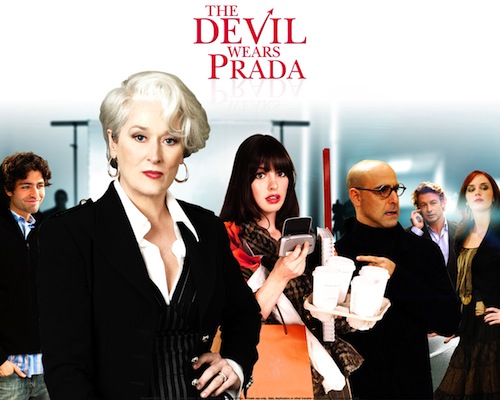
Those boom times may be over, but Revivalists’ entrepreneurial instincts haven’t vanished. HR professionals say that Americans born from the mid-1970s onward feel more entitled in terms of compensation, benefits, and career advancement than older generations. Revivalists expect to be paid more; they expect to have flexible work schedules; they expect to be promoted within a year of being hired; they expect to have more vacation or personal time; and they expect to have access to state-of-the-art technology. Revivalists reportedly have a tough time taking direction, since they regard their elders as dinosaurs who should just hand over the business! Which explains the Revivalist phenomenon of tell-all underling fiction and bloggery: Lauren Weisberger’s The Devil Wears Prada, Emma McLaughlin’s and Nicola Kraus’ The Nanny Diaries, Jessica Cutler’s Washingtonienne, Nadine Haobsh’s Jolie in NYC, Jeremy Blachman’s Anonymous Lawyer.

Donald Trump could not have launched The Apprentice using Recons as cast members. Omarosa Manigault-Stallworth and the other first-season strivers were Revivalists. Even Revivalist good-time gals and guys — e.g., Kimora Lee Simmons, Paris Hilton, Tila Tequila, and everyone from Jackass (with the exception of Johnny Knoxville, who is older) — are businesspeople.
RENEWING BYGONE CULTURAL FORMS AND FRANCHISES

In 2000, Arlie Hochschild wrote, of Revivalists: “To be sure, every American decade has fashion marketeers define generational looks and sounds, but probably never before have they so totally hijacked a generation’s cultural expression.”
To progressive older Americans, the Revivalists’ marked lack of ironic distance from received cultural forms is worrisome. Ironic OGXers and PCers mix and match fragments of received cultural forms, which sometimes results in works of great originality, and sometimes (e.g., Ben Stiller’s brand of comedy) simply means freshening up reheated entertainments with air quotes. But members of the 1974-82 cohort simply dig the past; think of how Andre 3000, Sisqo, Pink, and Jack White, among many other Revivalists, slip bygone cultural forms on and off like so many Halloween costumes. When it comes to venerable cultural forms and franchises, like vintage videogames, Revivalists want to reboot them.

Speaking of Halloween, heavily inked Revivalists like Angelina Jolie, 50 Cent, Drew Barrymore, Christina Ricci, Steve-O, David Beckham, Lil Wayne, Nicole Richie, Amy Winehouse, Eve, and the Suicide Girls have transformed their flesh into costumes.
Revivalism is, among other things, an un-ironic reheating of previous generations’ pop culture franchises. When Revivalist actresses portray cartoon heroines — for example, Sarah Michelle Gellar as Daphne from Scooby-Doo, Jessica Alba as Sue Storm from Fantastic Four, Rachael Leigh Cook as Josie from Josie and the Pussycats, Christina Ricci as Trixie from Speed Racer — there’s no distancing smirk, no look-at-me-playing-a-cartoon scenery-chewing.

The most widely beloved American and English rock acts of the 1974-82 cohort are, respectively, garage-rock revivalists (The Strokes, The White Stripes, Black Rebel Motorcycle Club, Kings of Leon, The Black Keys) and post-punk revivalists (Bloc Party, The Libertines, Editors, Interpol, Kaiser Chiefs, Babyshambles, Franz Ferdinand). Revivalist chanteuses Lauryn Hill, Alicia Keys, Norah Jones, and Amy Winehouse, meanwhile, are soul revivalists.

This is the generation that has been instructed a million times, by the American Idol judges, to “take a hit song from the past and make it your own, make it relevant.” American Idol stars Kelly Clarkson, Justin Guarini, Ruben Studdard, Clay Aiken, Carrie Underwood, Taylor Hicks, Jennifer Hudson, David Cook, Elliott Yamin, Kimberley Locke, Josh Gracin, Bo Bice, Bucky Covington, Blake Lewis, Danny Gokey, Chris Daughtry — not to mention Ryan Seacrest — are Revivalists. Adam Lambert might be the last Revivalist to become an American Idol star; the torch is now passing to the next generation.
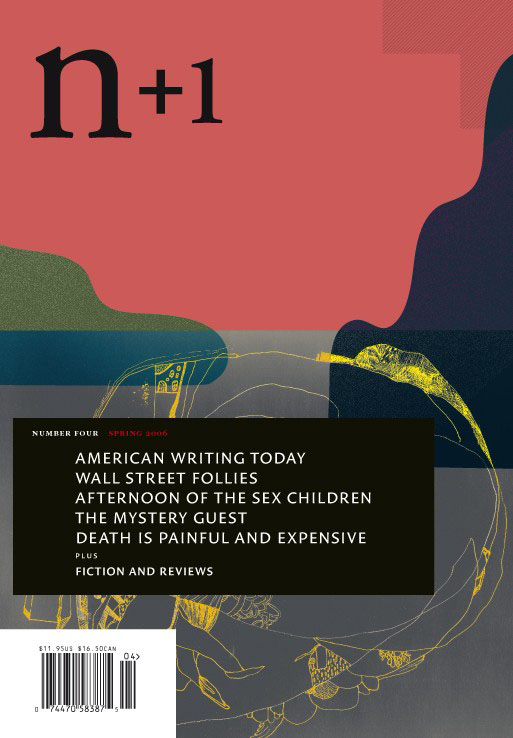
As for the aforementioned journal n+1, undoubtedly the Revivalist Generation’s most impressive accomplishment thus far, its editors are patently wistful for the New York Intellectual scene of the 1930s-50s. This is demonstrated not only by their socialist aspirations, intellectual sprezzatura, and eagerness for literary dust-ups, but by their journal’s design — a tribute to long-ago issues of Partisan Review and Dissent. Each n+1 cover is a love letter from the editors to a lively New York Intellectual scene about which they’ve only heard stories.
MOUSKETEERS & SCHOOL SHOOTERS

Having made all these (mostly) positive comments about the Revivalists, I should note that Middlebrow — which lost its firm grip on American youth after the Boomers, began to make a comeback in the Nineties. Revivalist celebrities Christina Aguilera, Britney Spears, Justin Timberlake, JC Chasez, Ryan Gosling, and Keri Russell got their start via the Disney Channel’s revived Mickey Mouse Club. Still, the Disneyfication of American youth is much more pronounced among the Revivalists’ immediate juniors, the Social Darwikians.
For what it’s worth, infamous school shooters Wayne Lo, Barry Loukaitis, Jamie Rouse, Evan Ramsey, Luke Woodham, Michael Carneal, Andrew Wurst, Kip Kinkel, and, of course, Columbine’s Eric Harris and Dylan Klebold, are Revivalists.
Meet the Revivalists.

HONORARY REVIVALISTS (born 1973): Neil Patrick Harris (actor), Stephenie Meyer (author of Twilight series), Franklin Foer (New Republic editor), Jason Zengerle (New Republic writer), Tyra Banks (model, created America’s Next Top Model), Madlib (rapper), Nas (rapper), Neve Campbell (actor, Party of Five), Mario Lopez (Slater on Saved by the Bell).

1974 (cuspers): Cee-Lo (rapper/singer, Goodie Mob, Gnarls Barkley), Lil’ Kim (rapper), Elizabeth Banks (actor), Harmony Korine (director), Steve-O (daredevil, Jackass), Meg White (drummer, White Stripes), Marco Roth (intellectual, n+1), Adrian Tomine (cartoonist), Amy Adams (actor), Ryan Adams (singer/songwriter), Christian Bale (actor), Fairuza Balk (actor), Victoria Beckham/Posh Spice (singer, Spice Girls), Big Moe (rapper), Melanie C/Sporty Spice (singer, Spice Girls), Kevin Connolly (actor, Eric Murphy on Entourage), Penelope Cruz (actor), Shaggy 2 Dope (rapper), Dale Earnhardt, Jr. (NASCAR), Donald Faison (actor, Turk on Scrubs), Jimmy Fallon (comic, Saturday Night Live), Jenna Fischer (actor, Pam Beesly on The Office), Mark-Paul Gosselaar (actor, Zack on Saved by the Bell), Seth Green (actor, Dr. Evil’s son Scott), Alyson Hannigan (actor, Willow on Buffy the Vampire Slayer), Tricia Helfer (actor, Number Six on Battlestar Galactica), Derek Jeter (baseball player), Jewel (singer/songwriter), Daniel Kessler (guitarist for Interpol), Eva Mendes (actor), Alanis Morissette (singer), Kate Moss (supermodel), Mekhi Phifer (actor), Ryan Phillippe (actor), Joaquin Phoenix (actor), Chris Pontius (skateboarder, Jackass), Giovanni Ribisi (actor), Ryan Seacrest (host of American Idol), Chloe Sevigny (actor, It Girl), Hilary Swank (actor), Tiffani Amber Thiessen (actor), Amber Valletta (actor, model), Barry Watson (actor Matt on 7th Heaven), Edgar Wright (director, Shaun of the Dead), Xzibit (rapper), Nicole Krauss (author), Nicola Kraus (author), Nicholas McCarthy (guitarist, Franz Ferdinand), Andrew White (guitarist, Kaiser Chiefs). HONORARY RECONSTRUCTIONISTS: Jemaine Clement (musician/actor, Flight of the Conchords), Stephen Merchant (film/TV producer, The Office, Extras), Leonardo DiCaprio (actor). Also Peter Rojas (blogger, Gizmodo, Engadget), whose birthdate is c. 1975.

1975: Russell Brand (actor, comic), Keith Gessen (author, n+1 editor), Mark Greif (intellectual, n+1 editor), Sara Gilbert (actor, Darlene on Roseanne), Lauryn Hill (soul/hip hop singer and producer), Jack Johnson (musician), Angelina Jolie (actor), Milla Jovovich (actor), Talib Kweli (rapper), M.I.A. (rapper), Zadie Smith (novelist), Sufjan Stevens (singer/songwriter), Jack White (musician, White Stripes), will.i.am (rapper, Black Eyed Peas), Tiger Woods (golfer), Natalie Imbruglia (singer/songwriter), Casey Affleck (actor), Drew Barrymore (actor, director, producer), Tom Anderson (co-founder of MySpace), André 3000 (musician, OutKast; fashionplate), Asia Argento (actor), Melanie B/Scary Spice (singer, Spice Girls), David Beckham (soccer star), Mayim Bialik (actor, Blossom Russo on Blossom), Jolene Blalock (actor, T’Pol on Enterprise), Moon Bloodgood (actor), Zach Braff (actor, Scrubs), 50 Cent (rapper), Bram Cohen (creator of BitTorrent), Hugh Dancy (actor), Stacy Ferguson (Fergie from Black Eyed Peas), Richard Kelly (wrote and directed Donnie Darko), Sean Lennon (musician), Max Levchin (co-founder of PayPal), Brian Littrell (The Backstreet Boys), Eva Longoria (actor, sex symbol), Tobey Maguire (actor), Danica McKellar (actor: Winnie Cooper on The Wonder Years; mathematician), Jamie Oliver (TV chef), Tara Reid (actor), Alex Rodriguez (baseball player), Kimora Lee Simmons (fashion designer), Charlize Theron (actor), KT Tunstall (singer/songwriter), Kate Winslet (actor), Nell Freudenberger (author), Curtis Sittenfeld (author), Jedediah Purdy (intellectual), Wendy Shalit (neocon prodigy), Zia McCabe (Suicide Girl, musician with Dandy Warhols).
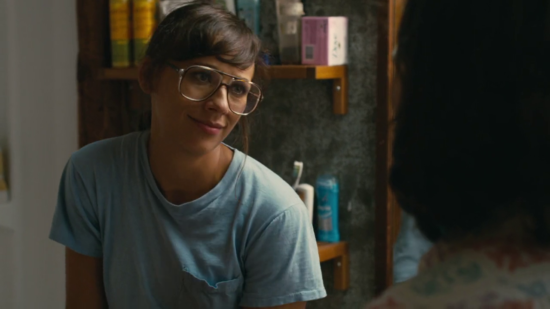
1976: Rashida Jones (actor), Salman Khan (founder of thr free online education platform Khan Academy), Rob Malda (Slashdot founder), Janus Friis (cofounded KaZaA, Skype), Yotuel Romero (rapper, Orishas), Chester Bennington (singer, Linkin Park), Jayson Blair (disgraced NYT reporter), Bloodshy (Swedish music producer), Emma Bunton/Baby Spice (Spice Girls), Orkut Buyukkokten (designed Google’s Orkut social network), Jennifer Capriati (tennis), Jenny Lewis (singer, actor), Sarah Chalke (actor, Dr. Reid on Scrubs), J. C. Chasez (*NSYNC), Brandon DiCamillo (Jackass), Anna Faris (actor), Colin Farrell (actor), Feist (singer/songwriter), Isla Fisher (actor), Soleil Moon Frye (actor, Punky Brewster), Adrian Grenier (actor, Vincent Chase on Entourage), Lukas Haas (actor), Melissa Joan Hart (actor, Sabrina, the Teenage Witch), Taylor Hicks (singer, American Idol alum), Jennifer 8. Lee (New York Times reporter), Peyton Manning (pro football), Danny Masterson (Hyde on That 70’s Show), Bret McKenzie (musician, actor: Flight of the Conchords), Freddie Prinze, Jr. (actor), Ronaldo (soccer star), Ja Rule (rapper), Keri Russell (actor: Felicity), Fred Savage (actor: The Wonder Years), Josh Schwartz (creator, The O.C.), Alicia Silverstone (actor), Audrey Tautou (actor), Jaleel White (actor: Urkel), Reese Witherspoon (actor), Wiley Wiggins (actor, musician), Dave Itzkoff (NYT writer), Peter Hayes (musician, Black Rebel Motorcycle Club), Amanda Palmer (musician, Dresden Dolls), Cat Deeley (So You Think You Can Dance host), Paul Thomson (drummer, Franz Ferdinand), Gordon Moakes (musician, Bloc Party).

1977: Selena “Missy Suicide” Mooney (cofounder, Suicide Girls), Sarah Michelle Gellar (Buffy on Buffy the Vampire Slayer), Jonathan Safran Foer (novelist), Danger Mouse (music producer), Chad Hurley (cofounder of YouTube), Kevin Rose (founder of Digg), Vinnie Paz (rapper, Jedi Mind Tricks), Laila Ali (boxer), Fiona Apple (musician), Oksana Baiul (figure skater), Orlando Bloom (actor), James Blunt (musician), Tom Brady (football player), Isaac Brock (frontman, Modest Mouse), Sophie Dahl (model), Dustin Diamond (actor, Screech on Saved by the Bell), Joey Fatone (*NSYNC), Edward Furlong (actor, Terminator 2), Ben Gibbard (singer, Death Cab for Cutie), Jon Gosselin (reality TV: Jon & Kate Plus 8), Maggie Gyllenhaal (actor), Elisabeth Hasselbeck (TV personality, The View), Jon Heder (actor, Napoleon Dynamite), Ludacris (rapper), Chris Martin (musician, Coldplay), John Mayer (musician), Bode Miller (ski champion), Brittany Murphy (actor), Kal Penn (actor, Harold & Kumar Go to White Castle), Jason Reitman (director), Jonathan Rhys-Meyers (actor), Shakira (musician), Liv Tyler (actor, model), James Van Der Beek (actor, Dawson on Dawson’s Creek), Tom Welling (actor, Superboy on Smallville), Kanye West (rapper, music producer), Lauren Weisberger (author, The Devil Wears Prada), Jeremiah Green (drummer, Modest Mouse), Daniel Alarcón (author), Simon Rix (bassist, Kaiser Chiefs), Nick Hodgson (drummer, Kaiser Chiefs), Spencer Krug (musician, Wolf Parade), Jaime Pressly (actor).

1978: Karen O (singer, Yeah Yeah Yeahs), Kristen Schaal (actor, Flight of the Conchords), Ben Cohen (activist), Jim James (frontman, My Morning Jacket), Ashton Kutcher (actor, Kelso on That 70’s Show), Clay Aiken (American Idol winner), Paul Banks (frontman, Interpol), Carl Barât (co-founder of The Libertines), Gael García Bernal (actor), Jason Biggs (actor, American Pie), Foxy Brown (rapper), Julian Casablancas (frontman, The Strokes), Laetitia Casta (model), Jessica Cutler (blogger, Washingtonienne), Diablo Cody (author), Eve (rapper), Kevin Federline (dancer), James Franco (actor, Freaks and Geeks), Nelly Furtado (musician), Topher Grace (actor, Eric Forman in That 70’s Show), Josh Hartnett (actor), Katherine Heigl (actor), Perez Hilton (gossip blogger), Katie Holmes (actor, Joey Potter on Dawson’s Creek), Joshua Jackson (actor, Pacey on Dawson’s Creek), John Legend (musician), Justin Long (actor, Mac commercials), Rachel McAdams (actor), Benjamin McKenzie (actor, The O.C.), A. J. McLean (The Backstreet Boys), Andy Samberg (actor, Saturday Night Live), Jake Shears (lead singer, Scissor Sisters), Sisqo (singer), Ruben Studdard (American Idol winner), Usher (musician), Robert Levon Been (musician, Black Rebel Motorcycle Club), Brian Chase (drummer, Yeah Yeah Yeahs), Nikolai Fraiture (bassist, The Strokes), Jamie Rouse (school shooter), Elliott Yamin (American Idol star), Steve Chen (co-founder, YouTube), Ben Lee (musician/actor), Ricky Wilson (Kaiser Chiefs), Drew McConnell (musician, Babyshambles).

1979: John Krasinski (actor, Jim Halpert on The Office), Dan Auerbach (guitarist, vocalist, The Black Keys), Avey Tare (founding member, Animal Collective), Lance Bass (*NSYNC), Brandy (singer, actor played Moesha on Moesha), Adam Brody (Seth Cohen on The O.C.), Catherynne M. Valente (sf/fantasy author), Rachael Leigh Cook (actor), Claire Danes (actor, My So-Called Life), Rosario Dawson (actor), Pete Doherty (ex-frontman for The Libertines), Jennifer Love Hewitt (actor), Kate Hudson (actor), Norah Jones (singer), Mindy Kaling (actor, screenwriter, Kelly Kapoor on The Office), Heath Ledger (actor), Evangeline Lilly (actor, Lost), Bam Margera (skateboarder, appears on Jackass), Matisyahu (Hasidic rapper), Petra Nemcova (model), B. J. Novak (screenwriter, actor, Ryan Howard on The Office), Pink (singer), Maggie Q (martial arts actor), Corinne Bailey Rae (singer), Mena Suvari (actor), Peter Wentz (bassist for Fall Out Boy), Nathan Followill (drummer, Kings of Leon), Matt Tong (drummer, Bloc Party), BRandon Routh (actor, Superman Returns).

1980: Conor Oberst (singer/songwriter), Jason Schwartzman (actor, Rushmore), Zooey Deschanel (actor), Jason Segel (actor), Eliza Dushku (actor), Shawn Fanning (Napster founder), Jake Gyllenhaal (actor), Christina Aguilera (singer), Kristen Bell (actor, Veronica Mars), Gisele Bundchen (Brazilian supermodel), Nick Carter (The Backstreet Boys), Anna Chlumsky (actor), Chelsea Clinton (president’s daughter), Macaulay Culkin (actor), Ryan Gosling (actor), Isaac Hanson (Hanson), Andy Hurley (drummer for Fall Out Boy), Kim Kardashian (socialite), Chris Masterson (Francis on Malcolm in the Middle), Chris Pine (actor, Star Trek’s new Captain Kirk), Laura Prepon (actor, Donna on That ’70s Show), Christina Ricci (Actor, The Addams Family), Ronaldinho (soccer star), Jessica Simpson (singer, actor), Regina Spektor (singer/songwriter), Channing Tatum (actor), Wilmer Valderrama (actor, Fez on That ’70s Show), Michelle Williams (actor, Jen on Dawson’s Creek), Venus Williams (tennis star), Zac Posen (fashion designer), Albert Hammond Jr. (musician, The Strokes), Chesa Boudin (left-wing writer), Nadine Haobsh (blogger, Jolie in NYC), Ben Savage (Actor, Boy Meets World), Eva Green (actor), Fabrizio Moretti (drummer, The Strokes).

1981: Beyoncé Knowles (singer, actor), Devendra Banhart (freak-folk musician), Paris Hilton (celebrity), Britney Spears (singer), Justin Timberlake (singer, *NSYNC, actor), Jessica Alba (actor), Rachel Bilson (actor, Racehel on The O.C.), Alexis Bledel (Actor, Rory on The Gilmore Girls), Barbara and Jenna Bush (president’s daughters), Hayden Christensen (actor, Star Wars), Danielle Fishel (Topanga on Boy Meets World), Jade Goody (British TV star), Joseph Gordon-Levitt (actor, Third Rock from the Sun), Josh Groban (musician), Eric Harris and Dylan Klebold (Columbine school shooters), Jennifer Hudson (actor), Alicia Keys (musician), Anna Kournikova (tennis star, model), John Walker Lindh (American Taliban), Sienna Miller (actor), Beverley Mitchell (Lucy on 7th Heaven), Natalie Portman (actor), Nicole Richie (TV personality), Jamie-Lynn Sigler (actor, The Sopranos), Julia Stiles (actor), Tila Tequila (TV personality), Nick Valensi (guitarist, The Strokes), Serena Williams (tennis star), Elijah Wood (actor, Frodo in Lord of the Rings), Ben Kweller (musician), Jonathan Taylor Thomas (actor, Home Improvement), Blake Lewis (American Idol alum), Amanda Beard (Olympic swimmer, model), Evan Ramsey (school shooter), Barry Loukaitis (school shooter), Luke Woodham (school shooter), Jens Lekman (Swedish indie pop musician), Gwenno Pipette (singer, The Pipettes), John Hassall (bassist, The Libertines), Kele Okereke (musician, Bloc Party), Russell Lissack (guitarist, Bloc Party), Tom Smith (frontman, The Editors), Chris Urbanowicz (guitarist, The Editors), Edward Lay (drummer, The Editors), Candylac Suicide (Anne Lindfjeld, Danish goth pin-up model, Suicide Girl).
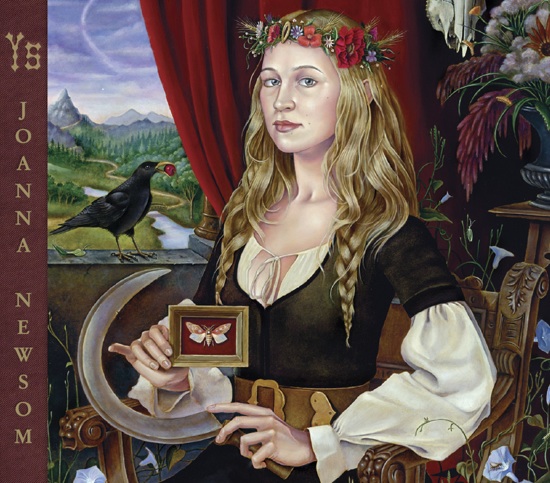
1982 (cuspers): Joanna Newsom (freak-folk musician), Jessica Biel (actor), Thora Birch (actor), Lacey Chabert (actor, Claudia on Party of Five), Kelly Clarkson (first winner of American Idol), Lupe Fiasco (rapper), Elisha Cuthbert (actor), Kirsten Dunst (actor), Lynndie England (Abu Ghraib dominatrix), Anne Hathaway (actor), Kat Von D (tattoo artist), Kristin Kreuk (actor, Lana on Smallville), Adam Lambert (American Idol star), Heather Matarazzo (actor, Welcome to the Dollhouse), Ne-Yo (singer-songwriter), Apolo Ohno (speed skater), Anna Paquin (actor), Brad Renfro (actor), LeAnn Rimes (country musician), Andy Roddick (tennis star), Yvonne Strahovski (actor, Sarah on Chuck), Lil’ Wayne (rapper), Prince William (British royalty), Nellie McKay (singer-songwriter), Caleb Followill (frontman, Kings of Leon), Amina Munster (Suicide Girl-type tattooed model), Dan Berger (comic book artist), Kip Kinkel (school shooter), Becki Pipette (singer, The Pipettes), Russell Leetch (bassist, The Editors). HONORARY SOCIAL DARWIKIANS: Micah White (activist, came up with the idea for Occupy Wall Street), Seth Rogen (actor), Dennis M. Moran (hacker, also known as Coolio; denial-of-service attacks), Evan Goldberg (Seth Rogen’s writing partner), Martin Starr (actor, Freaks and Geeks), Jay Baruchel (actor), Cory Monteith (actor, Glee), Kate Middleton (Catherine, Duchess of Cambridge).

HONORARY REVIVALISTS (born 1983): Amy Winehouse (singer), Mila Kunis (actor, Jackie on That ’70s Show), Jesse Eisenberg (actor, Wonderland, The Social Network).
READ MORE essays by Joshua Glenn, originally published in: THE BAFFLER | BOSTON GLOBE IDEAS | BRAINIAC | CABINET | FEED | HERMENAUT | HILOBROW | HILOBROW: GENERATIONS | HILOBROW: RADIUM AGE SCIENCE FICTION | HILOBROW: SHOCKING BLOCKING | THE IDLER | IO9 | N+1 | NEW YORK TIMES BOOK REVIEW | SEMIONAUT | SLATE
Joshua Glenn’s books include UNBORED: THE ESSENTIAL FIELD GUIDE TO SERIOUS FUN (with Elizabeth Foy Larsen); and SIGNIFICANT OBJECTS: 100 EXTRAORDINARY STORIES ABOUT ORDINARY THINGS (with Rob Walker).
